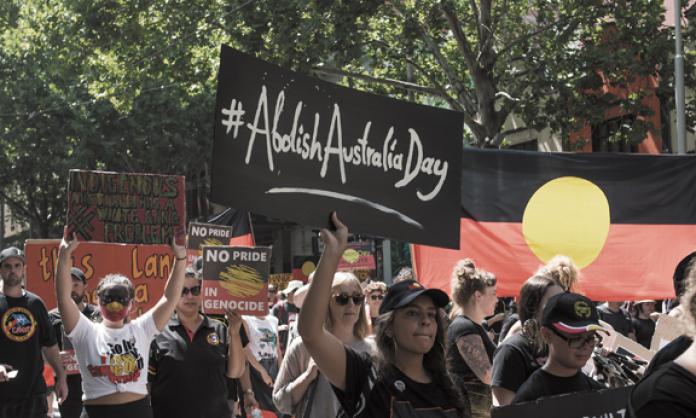26 January. A Day of tacky US-style patriotism and of supermarket specials on “Aussie” foods like mouldy yeast and putrid sausages. A day in which gangs of marauding drunk white men roam the streets wearing flags as capes. It’s sickening.
It doesn’t help that the Australian flag itself is so nauseating. Everything about its haughty colonial aesthetic screams “we killed black people here and we’re proud of it”. The composition says it all: the union jack is featured but not even a token reference to Indigenous communities and culture.
The really sickening thing, though, is what the day represents. Australia. Or, to be precise, Australian capitalism.
There are lots of different opinions about how to define Australia. Some would say that it’s a country of the fair dinkum fair go, where battlers and larrikins while away their days at barbecues with mates, and meat pies. In this Australia, everyone gets a fair shake of the sauce bottle, so long as they’re a lifter, not a leaner.
That Australia is a lie.
Australian capitalism was established by brutal genocide. Up to a million Indigenous people lived here prior to colonisation. By 1930 there were just 50,000. Before invasion there were 290-360 Aboriginal languages. Now there are only 13 that, according to the National Indigenous Languages Survey, are not endangered.
This genocide is not some historic episode. It is an ongoing policy, a political bias embedded deep in the DNA of the political establishment.
Indigenous children are being taken from their families at rates that surpass those experienced by the Stolen Generations. Aboriginal people are almost three times as likely to be unemployed, and 15 times more likely to be in prison. Indigenous health and education outcomes are similarly woeful. All of this is the result of systematic and structural discrimination, and despite bipartisan rhetorical commitment to “closing the gap”, the statistics are only getting worse.
The depravity of Australia’s treatment of Indigenous people is matched only by that of refugees. To be fair, the abuse of asylum seekers is a global phenomenon. The recent deaths of two Guatemalan children in the US rightfully sparked widespread condemnation of the Trump administration, while the European Union’s hardline approach to refugees has been blamed for causing thousands of deaths in the Mediterranean Sea.
Yet Australia’s refugee policy is more barbaric than anything Trump or Europe has managed.
Australia is the only country in the world that insists on the offshore detention and processing of all asylum seekers. Nor does any other country have as their policy a flat refusal to accept refugees who arrive by boat, even if it means the indefinite detention of innocent people.
The effect of this barbaric policy is that people like Iranian journalist Behrouz Boochani have spent more than 2,000 days in detention on a desert island with little hope for release, despite being a genuine refugee according to the United Nations.
Also unique to Australia is the bipartisan policy of boat turn-backs, whereby the navy forcibly repels all refugee vessels, a dangerous practice contrary to Australia’s humanitarian obligations.
This is just a snapshot of the racism that characterises Australian society. But there are many more reasons to oppose flag-waving Australian nationalism.
The recent scandal surrounding the Murray-Darling Basin points to the destructive impact of capitalist society on our natural world. It took corporate interests and their faithful representatives in parliament less than a decade to destroy a vibrant ecosystem that had existed for millennia.
Australia is also the world’s largest coal exporter, which makes this country disproportionately responsible for the global warming that threatens the lives of millions of people and the planet.
Then there’s the ongoing discrimination faced by women, Muslims and the LGBT community among others, all of whom are regular targets of the Murdoch press and the bigoted right.
One of the most profound, though least discussed, injustices of Australian capitalism is the massive gap between rich and poor. A 2018 Oxfam report found that the Australia’s richest 1 percent held an astonishing 23 percent of the country’s wealth, more than the bottom 70 percent of Australians combined.
So whether you’re an international student cleaning dishes for cash, or a fly in fly out worker in West Australia forced to share rooms and beds with your work mates, life is hard and getting harder. We’re getting screwed so that the rich can get richer. This is the real Australia.
CULTURE WARS
Contrary to the claims of those determined to defend this supposedly great tradition, 26 January has only recently become a day of any significance.
Paul Keating made it a national public holiday in 1994, but it was only later, during the Howard years, that cringe-worthy patriotism became a compulsory national ritual.
This coincided with Howard’s broader attacks on “political correctness”, the so-called “black armband” view of history (thinking that Captain Cook was anything other than a hero) and the broader gains of the social movements of the 1960s and 1970s.
Howard whipped up such conservative feeling – especially nationalism and racism – largely to distract from his anti-worker, neoliberal agenda. Encouraging a sense of national unity against a supposed threat – whether refugees, Indigenous people, union thugs or professional protesters – was a key way his government cohered support.
Fast forward a decade or so, and we’re now seeing a burgeoning movement against the celebration of Australia Day.
More and more people can now see that it is heartless to celebrate the day that the genocide of our Indigenous sisters and brothers began. This is true and a very welcome development.
But given what we know about Australian capitalism, there is no date that is appropriate for a celebration. Not until every single refugee is free, every killer cop is punished, every empty apartment is expropriated and every exploitative boss is put to work on equal terms with the rest of us. We’ll celebrate then all right, but we’ll have a new flag, and it will be all one colour.









